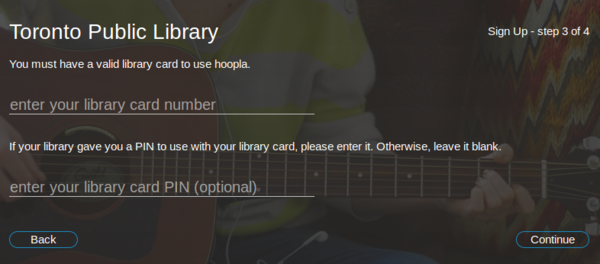There was good news Monday from the Toronto Public Library (TPL): Toronto Public Library Introduces Online Music and Video. It seemed good at the start, anyway.
Toronto Public Library has introduced a new service that allows customers to download or stream a wide variety of music and video content. With a library card, customers can access music albums from a wide variety of genres, movies, educational television and documentaries. More information is available at tpl.ca/hoopla.
“We’re happy to now offer customers a great selection of music and videos that they can easily stream or download. E-content is our fastest area of growth, with customers borrowing more than 2 million ebooks, eaudio-books and emagazines in 2013. We expect we’ll see even more growth this year with the introduction of online music and video,” said Vickery Bowles, Director of Collections Management at Toronto Public Library.
With just a library card, customers can listen to a wide selection of music albums and watch a variety of video content. Content may be borrowed via a browser, smartphone or tablet and instantly streamed or downloaded with no waiting lists or late fees. Customers may borrow up to five items per month.
Here’s a CBC news report about: Hoopla comes to Toronto: Toronto’s libraries are introducing a new Netflix-like service.
Seems like a very nice service. I’m happy to see my local library system working to get more streaming media to people in Toronto. I’m unhappy with the privacy implications of this, however. (As is Kate Johnson, a professor at the library school at the University of Western Ontario, who’s interviewed in that video clip: she raises the privacy question, but the reporter completely drops the issue). Here are my speculations based on a brief examination of what I see.
The TPL’s page about the new service explains how it works. It says you need an “account at hoopladigital.com (library card and email address required to create)” and “because Hoopla requires a separate account to be created, you may wish to review their privacy policy.” The privacy policy is, oddly, a PDF hosted at an unmemorable Cloudfront URL, and not the official privacy policy on Hoopla’s web site. They are different. For example, the web site version says, “As you use the hoopla service, we record how you use our application, including the materials you borrow. This information is reported to your library, content providers, and licensing agencies. When it is reported, it is always reported in aggregate with other patrons. It is never reported in a manner that associates your account with specific content or activities.” (Update at 19:25: that privacy policy link has been corrected to go to Hoopla’s site.)
None of that bothered me particularly, so I went to sign up for an account to try it out. This is the third step in the process:

“Enter your libary card number,” it says. “If your library gave you a PIN to use with your library card, please enter it.” I have a PIN, but I stopped here. (I don’t know what happens to people without a password; I’d guess they’re asked to set one up.)
So Hoopla wants my library card number. I posted a comment on Twitter about that and got a number of responses, including three from Michelle Leung (@mishiechau), who said, we review 3rd prty privcy polcies 2 portect cust + we suggest cust. do the same… and we haven’t given hoopla a dump of card #s in advance their systms chk w/ours@ acnt creation time 2 c if user valid..
Certainly Hoopla needs to be sure that anyone claiming to be a Toronto Public Library user actually is. But it looks like they’re doing it by asking the user for their library card number and password and then asking TPL if that is a valid account.
This is not right. There’s no need for any third party to know my library card number. OAuth would be a better way to do it: as it says, it’s “an open protocol to allow secure authorization in a simple and standard method from web, mobile and desktop applications.” This is what they say to anyone offering services online: “If you’re storing protected data on your users’ behalf, they shouldn’t be spreading their passwords around the web to get access to it. Use OAuth to give your users access to their data while protecting their account credentials.”
Who’s behind Hoopla, anyway? It’s a sevice run by Midwest Tape, who on their Twitter account say “Midwest Tape is a full service DVD, Blu-ray, music CD, audiobook, and Playaway distributor, conducting business exclusively with public libraries since 1989.” They’re run out of Holland, Ohio, in the United States.
I suspect this means the Toronto Public Library is offering a service that requires users to give their library card number and password to an American company that will store it on American servers, which means the data is available to the US government through the PATRIOT Act. (Of course, we also need to assume that all library data can be access by our spy agencies, but we need to do what we can.)
I may be wrong. I’ll ask Hoopla and TPL and update this with what I find.
 Miskatonic University Press
Miskatonic University Press